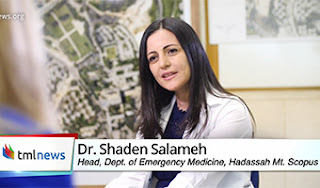APARTHEID ISRAEL?
Last week I was
a patient in one of the two Hadassah hospitals in Jerusalem. I was placed in a
room with two beds in the senior citizen’s
cardiology department. The other bed was occupied by an Arab Christian
woman from Bethlehem who was accompanied by her approximately 50 year old son.
He slept next to her in a couch by her bed, and used the same facilities. There
is a Palestinian hospital in Bethlehem but they preferred an Israeli hospital
even though they had to pay privately. They were once part of a predominantly
Christian Arab population. Today,
Bethlehem is almost devoid of Christians, as the result of persecution by their
Muslim brothers – and not only in Bethlehem.
Israel’s public healthcare system is a model of
genuine commonality between Arabs and Jews. In the government healthcare system, Arabs
fill 12.4% of jobs; in nursing studies 42% of students are Arab;
pharmaceuticals has become identified with the Arab community – 38% of
druggists are Arab; at Superpharm, the largest drugstore chain, 62% of the
pharmacists are Arabs. In medicine itself, the proportion of Arabs is roughly
akin to their proportion in the population.
The village of
Arrabeh, to the north of Nazareth, may look like just another quiet community
in the Lower Galilee. But, if you take a closer look at the 24,000 residents, you’ll
notice a lot of them preface their names with the title “Dr.” It boasts one of
the highest numbers of doctors per capita in the world. The Israeli Arab
community has more than six doctors per thousand inhabitants, according to a
2015 report by community activist Makbula Nassar, a journalist
and presenter of current affairs programs.
Describing her pioneering role as “a great responsibility, with a lot of pride,” Dr. Shaden Salameh is the first Arab female physician to head up a hospital emergency room in Israel. As director of the Hadassah Hospital Mount Scopus Emergency Medicine Department, Dr. Salameh explains that the greater the challenge, the more motivated she is. As the mother of three young children under six, and married to a physician, she attributes part of her ability to juggle her demanding life, to the ability of women to multitask.
Israeli Arabs
are equally represented in academia, slightly over-represented in medical
fields, have the third largest block in the Knesset, a judge on the Supreme
Court and an Arab heads Israel’s largest bank, Bank Leumi.
The Arab refugees
languishing in camps in Lebanon, Jordan and Syria couldn’t
be a better example of apartheid. They are there because the United Nations
wants them there. Otherwise they could do something about it.



Comments
Post a Comment